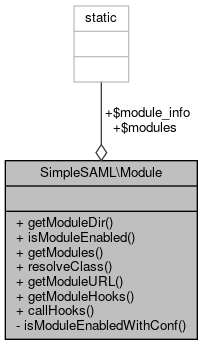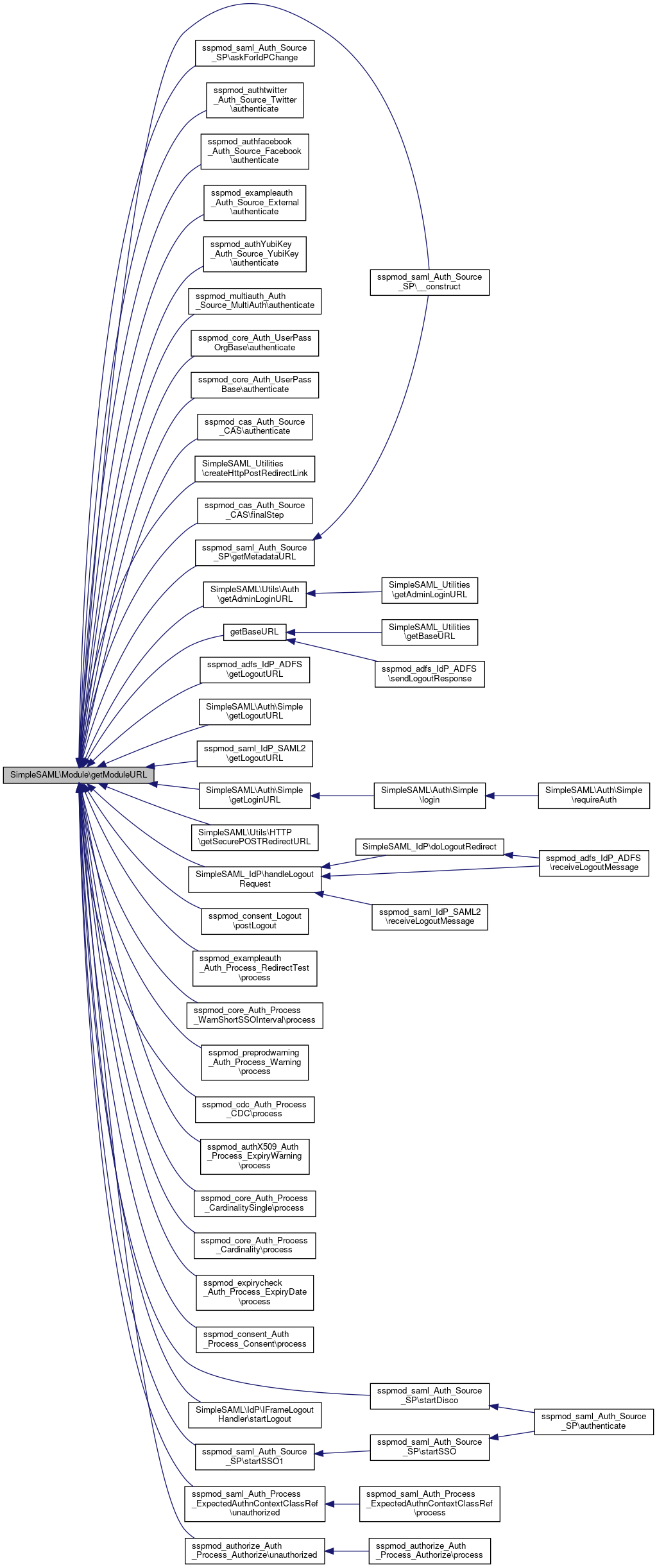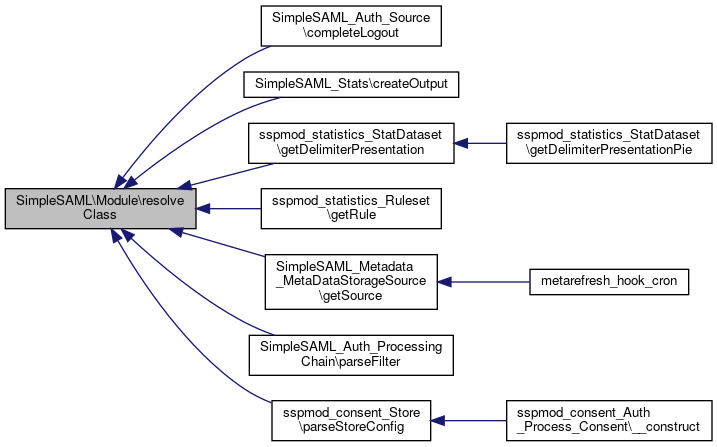 Collaboration diagram for SimpleSAML\Module:
Collaboration diagram for SimpleSAML\Module:Static Public Member Functions | |
| static | getModuleDir ($module) |
| Retrieve the base directory for a module. More... | |
| static | isModuleEnabled ($module) |
| Determine whether a module is enabled. More... | |
| static | getModules () |
| Get available modules. More... | |
| static | resolveClass ($id, $type, $subclass=null) |
| Resolve module class. More... | |
| static | getModuleURL ($resource, array $parameters=array()) |
| Get absolute URL to a specified module resource. More... | |
| static | getModuleHooks ($module) |
| Get the available hooks for a given module. More... | |
| static | callHooks ($hook, &$data=null) |
| Call a hook in all enabled modules. More... | |
Static Public Attributes | |
| static | $modules = array() |
| static | $module_info = array() |
Static Private Member Functions | |
| static | isModuleEnabledWithConf ($module, $mod_config) |
Detailed Description
Definition at line 12 of file Module.php.
Member Function Documentation
◆ callHooks()
|
static |
Call a hook in all enabled modules.
This function iterates over all enabled modules and calls a hook in each module.
- Parameters
-
string $hook The name of the hook. mixed &$data The data which should be passed to each hook. Will be passed as a reference.
- Exceptions
-
SimpleSAML_Error_Exception If an invalid hook is found in a module.
Definition at line 281 of file Module.php.
Referenced by core_hook_sanitycheck(), sspmod_portal_Portal\getLoginInfo(), portal_hook_htmlinject(), SimpleSAML\Module\cron\Cron\runTag(), sanitycheck_hook_cron(), and SimpleSAML_exception_handler().
 Here is the caller graph for this function:
Here is the caller graph for this function:◆ getModuleDir()
|
static |
Retrieve the base directory for a module.
The returned path name will be an absolute path.
- Parameters
-
string $module Name of the module
- Returns
- string The base directory of a module.
Definition at line 39 of file Module.php.
References $baseDir, $module, and $moduleDir.
Referenced by SimpleSAML_XHTML_Template\findThemeTemplateDirs(), SimpleSAML\Locale\Translate\getDictionary(), sspmod_core_Auth_Process_AttributeMap\loadMapFile(), sspmodAutoloadPSR0(), and sspmodAutoloadPSR4().
 Here is the caller graph for this function:
Here is the caller graph for this function:◆ getModuleHooks()
|
static |
Get the available hooks for a given module.
- Parameters
-
string $module The module where we should look for hooks.
- Returns
- array An array with the hooks available for this module. Each element is an array with two keys: 'file' points to the file that contains the hook, and 'func' contains the name of the function implementing that hook. When there are no hooks defined, an empty array is returned.
Definition at line 242 of file Module.php.
◆ getModules()
|
static |
Get available modules.
- Returns
- array One string for each module.
- Exceptions
-
Exception If we cannot open the module's directory.
Definition at line 121 of file Module.php.
Referenced by core_hook_sanitycheck().
 Here is the caller graph for this function:
Here is the caller graph for this function:◆ getModuleURL()
|
static |
Get absolute URL to a specified module resource.
This function creates an absolute URL to a resource stored under ".../modules/<module>/www/".
- Parameters
-
string $resource Resource path, on the form "<module name>/<resource>" array $parameters Extra parameters which should be added to the URL. Optional.
- Returns
- string The absolute URL to the given resource.
Definition at line 220 of file Module.php.
Referenced by sspmod_saml_Auth_Source_SP\__construct(), sspmod_saml_Auth_Source_SP\askForIdPChange(), sspmod_authfacebook_Auth_Source_Facebook\authenticate(), sspmod_authtwitter_Auth_Source_Twitter\authenticate(), sspmod_authYubiKey_Auth_Source_YubiKey\authenticate(), sspmod_cas_Auth_Source_CAS\authenticate(), sspmod_core_Auth_UserPassBase\authenticate(), sspmod_core_Auth_UserPassOrgBase\authenticate(), sspmod_exampleauth_Auth_Source_External\authenticate(), sspmod_multiauth_Auth_Source_MultiAuth\authenticate(), SimpleSAML_Utilities\createHttpPostRedirectLink(), sspmod_cas_Auth_Source_CAS\finalStep(), SimpleSAML\Utils\Auth\getAdminLoginURL(), getBaseURL(), SimpleSAML\Auth\Simple\getLoginURL(), SimpleSAML\Auth\Simple\getLogoutURL(), sspmod_adfs_IdP_ADFS\getLogoutURL(), sspmod_saml_IdP_SAML2\getLogoutURL(), sspmod_saml_Auth_Source_SP\getMetadataURL(), SimpleSAML\Utils\HTTP\getSecurePOSTRedirectURL(), SimpleSAML_IdP\handleLogoutRequest(), sspmod_consent_Logout\postLogout(), sspmod_core_Auth_Process_Cardinality\process(), sspmod_core_Auth_Process_CardinalitySingle\process(), sspmod_authX509_Auth_Process_ExpiryWarning\process(), sspmod_cdc_Auth_Process_CDC\process(), sspmod_consent_Auth_Process_Consent\process(), sspmod_core_Auth_Process_WarnShortSSOInterval\process(), sspmod_exampleauth_Auth_Process_RedirectTest\process(), sspmod_expirycheck_Auth_Process_ExpiryDate\process(), sspmod_preprodwarning_Auth_Process_Warning\process(), sspmod_saml_Auth_Source_SP\startDisco(), SimpleSAML\IdP\IFrameLogoutHandler\startLogout(), sspmod_saml_Auth_Source_SP\startSSO1(), sspmod_authorize_Auth_Process_Authorize\unauthorized(), and sspmod_saml_Auth_Process_ExpectedAuthnContextClassRef\unauthorized().
 Here is the caller graph for this function:
Here is the caller graph for this function:◆ isModuleEnabled()
|
static |
Determine whether a module is enabled.
Will return false if the given module doesn't exist.
- Parameters
-
string $module Name of the module
- Returns
- bool True if the given module is enabled, false otherwise.
- Exceptions
-
Exception If module.enable is set and is not boolean.
Definition at line 59 of file Module.php.
References $config, $module, and SimpleSAML_Configuration\getOptionalConfig().
 Here is the call graph for this function:
Here is the call graph for this function:◆ isModuleEnabledWithConf()
|
staticprivate |
Definition at line 66 of file Module.php.
References $module, $moduleDir, and SimpleSAML\Logger\error().
 Here is the call graph for this function:
Here is the call graph for this function:◆ resolveClass()
|
static |
Resolve module class.
This function takes a string on the form "<module>:<class>" and converts it to a class name. It can also check that the given class is a subclass of a specific class. The resolved classname will be "sspmod_<module>_<$type>_<class>.
It is also possible to specify a full classname instead of <module>:<class>.
An exception will be thrown if the class can't be resolved.
- Parameters
-
string $id The string we should resolve. string $type The type of the class. string | null $subclass The class should be a subclass of this class. Optional.
- Returns
- string The classname.
- Exceptions
-
Exception If the class cannot be resolved.
Definition at line 169 of file Module.php.
References $id, $type, and if.
Referenced by SimpleSAML_Stats\createOutput(), sspmod_statistics_StatDataset\getDelimiterPresentation(), sspmod_statistics_Ruleset\getRule(), SimpleSAML_Metadata_MetaDataStorageSource\getSource(), SimpleSAML_Auth_ProcessingChain\parseFilter(), and sspmod_consent_Store\parseStoreConfig().
 Here is the caller graph for this function:
Here is the caller graph for this function:Field Documentation
◆ $module_info
|
static |
Definition at line 27 of file Module.php.
◆ $modules
|
static |
Definition at line 20 of file Module.php.
The documentation for this class was generated from the following file:
- libs/composer/vendor/simplesamlphp/simplesamlphp/lib/SimpleSAML/Module.php








